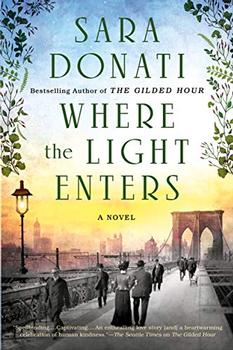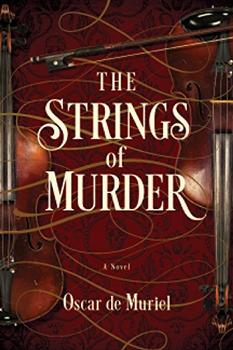Summary | Excerpt | Reviews | Beyond the book | Read-Alikes | Genres & Themes | Author Bio

A Madeleine Karno Mystery
by Lene KaaberbolAs novels about amateur detectives go, this one – about young Madeleine (Maddie) Karno in the French provincial village of Varbourg – is a pip. It's the last decade of the nineteenth century and women's suffrage in France is still a half-century away, but never mind the right to vote – Maddie just wants to be able to follow in her father's professional footsteps. Fascinated by science and inspired by the period's progressive breakthroughs, the 20-year-old wants to become, not just a scientist, but a forensic physician. It is a necessary profession that others disdain even for a man. Her father, Dr. Karno, is known among locals as Doctor Death.
Because medical school is out of the question, Maddie must end run the system to learn the craft. She eavesdrops on her father's conversations with other physicians and the police. She sneaks into the operating theatre at the local teaching hospital to observe the latest surgical techniques. She conspires to assist her father whenever she can. But when 17-year-old Cecile Montaine's body is discovered on the street outside the Montaine family home, Maddie's interest in forensic medicine is no longer purely academic. The deceased is close to Maddie's age and her death is a real mystery – more so because the family will not permit an autopsy.
From all outside appearances, Cecile seems unmolested. Yet the cause of death is suspicious. So Dr. Karno is asked to visually inspect the body, but do nothing invasive. When he notices infinitesimal mites in her nostrils and mouth, he takes a sample in order the study this anomaly. Maddie is in her glory. Dr Karno cannot immediately identify the mites so he asks her to draw a picture of one and take it to parasitologist Professor August Dreyfuss at the prestigious Forchhammer Institute in Heidelberg.
Then three plot-thickening events happen in rapid succession. The murdered body of Father Abigore, the Montaine family priest, is discovered in a refrigerated boxcar full of meat. Dr. Karno suffers a broken arm and a leg in a vehicular accident. And the newly discovered priest's body is stolen en route from boxcar to morgue. As Holmes would say, the game is afoot. And Maddie is propelled to the front, standing in for her laid-up father.
I read this in one sitting, propping it up against the salt-and-pepper shakers at mealtimes. Right away I was drawn in by Danish author Lene Kaaberbol's descriptive prose. "It is snowing. The snow falls on the young girl's face, on her cheeks, mouth, and nose, and on her eyes. She does not blink it away. She lies very still in her nest of snow… Around her the city is living its nightlife, the hansom cabs clatter by in the cobblestone slush on the boulevard… But here in the passageway where she lies, there is no life." I immediately felt cloaked in late nineteenth century France.
Then, of course, there is Maddie. Kaaberbol fashions her as a fully developed human. She is ambitious: "While he bent over the…microscope, I felt a certain unfamiliar irritation. It was not my usual impatience; it was that I did not want his permission, I wanted the right." She is also unafraid to use a man's prejudices against him: "He was about to angrily refuse… But at that moment inspiration struck and I knew how to convince him. I blinked rapidly a few times to stimulate the tear ducts. Then I placed a pleading hand on his arm." And although she likes to fancy herself progressive and cerebral, her physical attraction to Professor Dreyfuss confounds her, creating a cognitive dissonance she isn't entirely comfortable with, yet cannot resist.
I look forward to donning the cloak of nineteenth century France again soon when Madeleine Karno returns. The second book in the series is already published in Lene Kaaberbol's home country of Denmark, so it is safe to assume we'll be seeing The Living Flesh in English before too long.
![]() This review was originally published in The BookBrowse Review in March 2015, and has been updated for the
February 2016 edition.
Click here to go to this issue.
This review was originally published in The BookBrowse Review in March 2015, and has been updated for the
February 2016 edition.
Click here to go to this issue.

If you liked Doctor Death, try these:

by Sara Donati
Published 2020
From the international bestselling author of The Gilded Hour comes Sara Donati's enthralling epic about two trailblazing female doctors in nineteenth-century New York.

by Oscar de Muriel
Published 2017
The brutal slaying of a violinist in his home in 1888 sparks a locked room murder mystery investigated by two diametrically opposed Edinburgh detectives.
Your guide toexceptional books
BookBrowse seeks out and recommends the best in contemporary fiction and nonfiction—books that not only engage and entertain but also deepen our understanding of ourselves and the world around us.